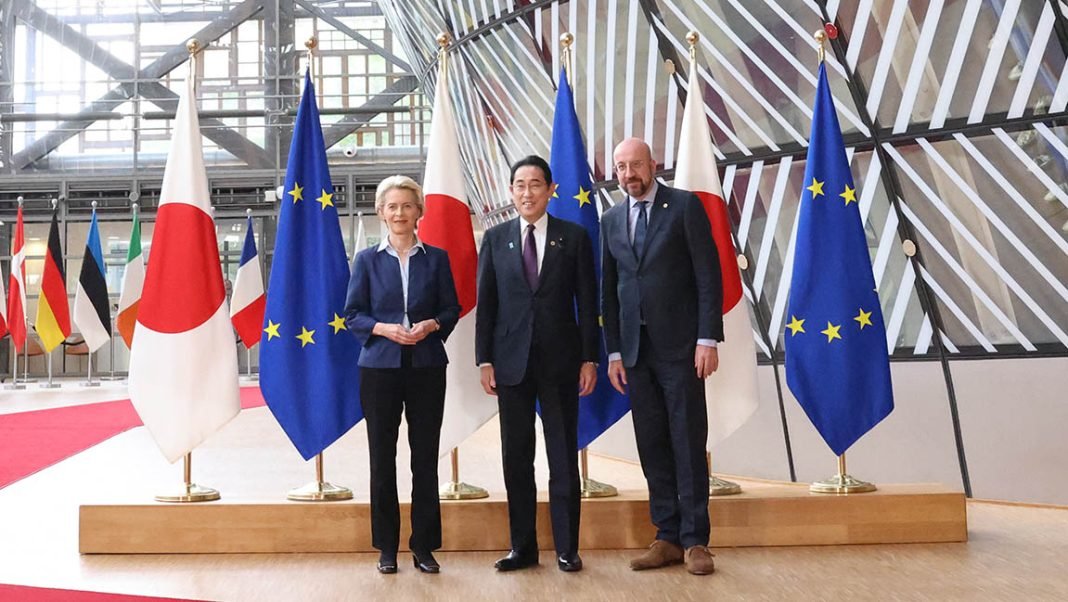Brussels, 13 July 2023 (TDI): The 29th EU-Japan Summit was held in Brussels, bringing together the President of the European Council, Charles Michel, President of the European Commission, Ursula von der Leyen, and Japanese Prime Minister Fumio Kishida.
The Summit, held on July 13, 2023, celebrated the ever-closer strategic partnership between the European Union and Japan, based on shared values and a commitment to multilateralism in addressing global challenges and meeting the needs of citizens.
🇪🇺🇯🇵 EU and Japanese leaders met today in Brussels.
They committed to working together to:
🕊️ promote peace and security
💶 ensure prosperity and economic security
🤖 foster human-centric digitalisation
🔥 tackle climate change
🌏 achieve sustainable development #EUJapan— EU Council (@EUCouncil) July 13, 2023
The leaders of the EU and Japan issued a joint statement, expressing their satisfaction with the progress made in bilateral relations and their dedication to working collaboratively on various key areas.
The two sides compared notes on various sectors to enhance partnerships in different sectors and address current international challenges.
Emphasizing Peace and Security
Peace, security, and the rule of law were emphasized, with both parties supporting a just and durable peace based on respect for international law and the principles of the UN Charter.
The EU and Japan reiterated their resolute support for Ukraine and their opposition to Russia’s aggression, standing united against ongoing developments in the conflict.
Additionally, they condemned North Korea’s continued development of nuclear weapons and ballistic missiles, in violation of UN Security Council resolutions.
The EU and Japan affirmed their commitment to constructive and stable relations with China, recognizing the country’s importance in the international community and the global economy.
The leaders acknowledged the interlinkage between the security of Europe and the security of the Indo-Pacific region.
In light of unprecedented challenges to peace and security, they pledged to further develop their security partnership. This entails increased cooperation in areas such as maritime security, cybersecurity, hybrid threats, counter-terrorism, disarmament, and non-proliferation.
Emphasizing Free Economy
Economic security and trade were also prominent topics of discussion. The EU and Japan committed to enhancing their dialogue and cooperation to defend their global interests while preserving an open economy.
They highlighted the importance of fully implementing the EU-Japan free trade agreement, which has already yielded positive results, with trade in goods and agri-food seeing significant growth since its entry into force in 2018.
Japan welcomed the EU’s decision to lift import restrictions on food products from the Fukushima region, implemented after the 2011 earthquake.
Accelerate Cooperation in Technology and Environment Sector
Recognizing the significance of digital transformation, the leaders agreed to accelerate cooperation in areas such as semiconductors, high-performance computing, 5G technology, and resilient digital connectivity.
They also encouraged international discussions on AI governance to promote trustworthy AI.
Also Read: EU’s Five Demonstrations of Solidarity with Ukraine
The EU and Japan emphasized their commitment to energy and green transitions, aiming for net-zero emissions by 2050.
They pledged to cooperate in areas such as energy efficiency, low-carbon and renewable hydrogen, offshore renewable energy, and carbon capture and recycling.
The leaders also underlined the importance of resource efficiency, a circular economy, combating plastic pollution, developing secure and transparent global LNG markets, and fighting illegal fishing.
Looking Forward to Sustainable Development
In the realm of sustainable development, the EU and Japan welcomed the progress made and looked forward to further cooperation on connectivity projects that foster sustainable and inclusive growth in partner countries.
Health security was another area of cooperation, with the leaders committing to enhance health security, strengthen the global health architecture, achieve universal health coverage, and conclude negotiations on an international instrument for pandemic prevention, preparedness, and response.
A diligent individual with a Bachelor's in International Relations and currently pursuing a Master's in Political Science at the University of Cologne, Germany. With a strong academic background and a passion for understanding global politics, I aim to make a meaningful impact in the field of international affairs.








